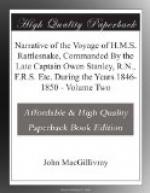After I had carefully examined all these things, I left them where I found them. In the centre of the camp were four large ovens, for cooking their food. These ovens were constructed by digging a hole in the ground, about three feet in diameter, and two feet deep. The hole is then filled to within six inches of the top with smooth, hard, loose stones, on which a fire is kindled, and kept burning till the stones are well heated. Their food, consisting principally of shell and other fish, is then placed on the stones and baked.
There were no vessels in the camp in which they could boil anything, and it is my opinion, from what I afterwards saw of their habits, that their cookery is confined to roasting and baking. In the camp were several large shells for holding water, and some calabashes, made by taking out the inside of a gourd, which grows plentifully near the camp. These calabashes would hold from one to three pints each.
June 12.
This morning Taylor endeavoured to cross the river with the rope for working our punt, but although an expert swimmer, and a very strong man, he was unable to do so, from the strength of the tide which was running out. We saw several natives fishing in the river from their canoes, which are about five feet long and one and a half feet wide, made of bark, with small saplings tied along the side, and are paddled with small pieces of bark held in either hand. We made signs to them to come to us, with which three of them complied. We made them understand that if they would take our rope across, and make it fast to a dead tree on the other side of the river, we would give them a tomahawk. They consented to undertake the task, and after great exertion succeeded in performing it, and received their reward, with which they seemed quite satisfied and highly pleased. We succeeded in getting everything across this river by ten o’clock P.M., for the moon being up we would not stop till we had finished. Our horses we took about a quarter of a mile up the river, and they crossed where it was narrower and not so deep. Several natives, who had not yet seen our horses, assembled on the banks of the river to see them cross, and when they came out of the water commenced shouting to frighten them, continuing their noise for about twenty minutes. Seeing at length, however, that the beasts submitted to be led quietly along the beach, they came near the camp, and we made them a present of a few fish-hooks. They returned to their camp before sunset.
The river we crossed this day was not so deep as either of the former ones. There is, apparently, a sandbank across all the rivers emptying themselves into Rockingham Bay, near the mouth, and this one formed no exception to the rule. The tide runs up very strongly, I should think from a mile and a half to two miles.
There is a mangrove swamp running up some distance on the northern side of the river, till it joins the freshwater swamps. There is not so much fresh water running out of this river as from the last, and fresh water is only procurable from the south side near the swamp—it being impossible to penetrate the scrub on the northern side to obtain it. At low-water the river is very shallow, with a muddy bottom.




